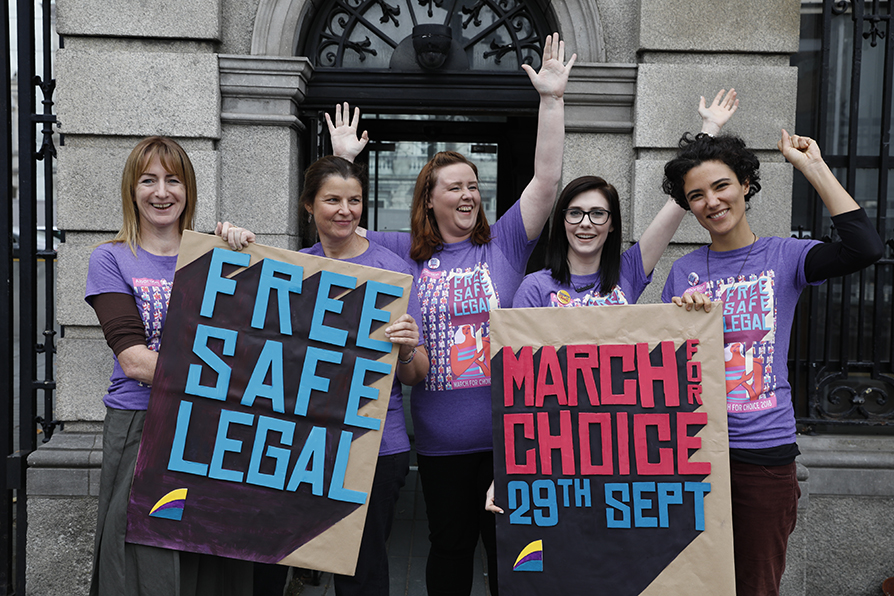
Clare Daly, Dr Mary Favier, Cathie Shields, Gearóidín McEvoy, Paola Rivetti
As the Government prepares to introduce abortion legislation, we explain how vitally important it is that activists stay involved and push for the best legislation – and provision – possible.
“Legal change and legislation counts for about 10% of abortion provision and implementation is the other 90%.”
These were the valuable words of cautionary advice from Dr Mary Favier, speaking at our 7th Annual March for Choice press conference last month. Her speech pointed out that repealing the 8th was a momentous achievement, but in real terms, the hard work is only just beginning. When we fought to remove the 8th from our Constitution, we were fighting for the opportunity to have control over our own bodies and lives. Now, that the opportunity has arrived, we need to make the most of it.
So what’s next?
Legislation is the first step. Politicians are currently deciding our futures in the Dáil as they debate the Health (Regulation of the Termination of Pregnancy) Bill that will allow for abortion in Ireland. As ARC have outlined in our submission to the Government, the proposed Bill is problematic in many ways. It is trans-exclusionary and contains(among other things) a non-evidence based mandatory waiting period, refusal of care and criminal sanctions on the part of medical practitioners.
Implementation of services
Many of the clauses within the Bill will make the implementation of services extremely difficult. The vague terminology and emphasis on criminal sanctions are two examples. Dr Favier spoke at length about the “chilling effect” these clauses will have on medical practitioners, many of whom will be providing abortion for the first time once the new laws are introduced. Without training and values clarification work, Dr Favier warned that medics may interpret these laws over-stringently or refuse to provide care altogether (“conscientiously object”) for fear of prosecution or other sanctions.
Beyond the legislation, a lot of work remains to be done when it comes to effective implementation of abortion services. We need to insist that budgets allocate enough money to provide the services we deserve. We need to talk about access and the fact that currently, abortions after 9 weeks are due to take place in a hospital setting (which will be geographically inaccessible for many). We need to talk about staffing and provision, ensuring that nurses and midwives are trained and feel confident enough to provide abortions. These were just a few of the practical issues that Dr. Favier raised in her speech.
It’s easy to assume that all of these problems have been ironed out by now, but the truth is, they haven’t. That means that we have the power to influence them. If we don’t, we’ll end up with bad legislation and poor provision, which does not serve the needs of pregnant people in Ireland.
And while many of us are (understandably) exhausted after the referendum campaign, we can’t afford to become complacent now. This is a once in a lifetime chance to shape the services we want to see introduced in Ireland.
The power of activists
We know from elsewhere around the world that the voices of activists are crucial when ensuring that a country’s abortion laws and policies are patient-centred. Dr Mary Favier of Doctors for Choice highlighted this in her speech:
“All the international evidence shows that where activists stayed involved, the best implementation occurred. So that’s the push, you need to be out there discussing all these issues and problems around implementation.”
It’s absolutely vital that we, the people who pounded the pavements, leafletted come rain or shine, had the conversations, and shared our stories, do not step back at this all-important stage in our history. The expertise we as activists can provide is invaluable. We don’t need to know the ins and outs of legal or clinical processes. We can speak from our experiences and those of the people in our lives to highlight the dangers that come about from practices which are not truly pregnant-person centred.
We can speak about how a mandatory waiting period or a doctor or midwife refusing care would affect us. We can talk about how restrictions to access harm vulnerable groups the most.
And once services start being rolled out? We’ll need to keep pushing. As Dr Favier mentioned in her speech (and as we can see from other parts of the world like Poland and the US where reproductive rights are under constant threat) this is a long-term fight. It will take years to get implementation right. And once that happens, activists will need to stay involved to ensure that we don’t lose those hard-won rights.
How you can help
Start talking. Talk to your TD. Talk to your GPs. Talk to those in your lives. Volunteer with ARC.
We need to utilise the conversations that won the referendum campaign. We need to ramp up the pressure and make ourselves heard. We did not come this far to stop now.
With thanks to Dr. Mary Favier for her powerful speech at this year’s March for Choice Press Conference.
_________________________________________________________________________________

